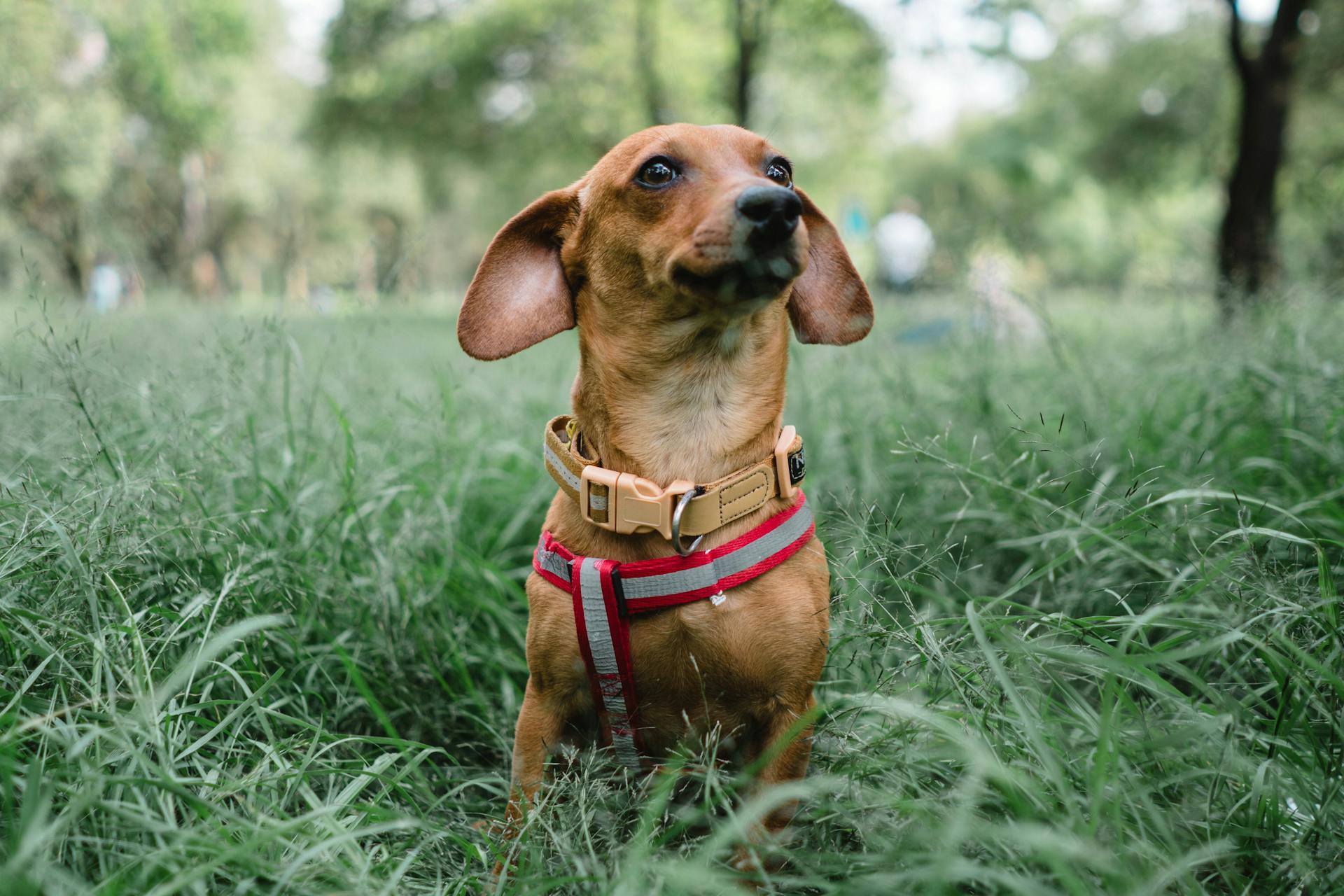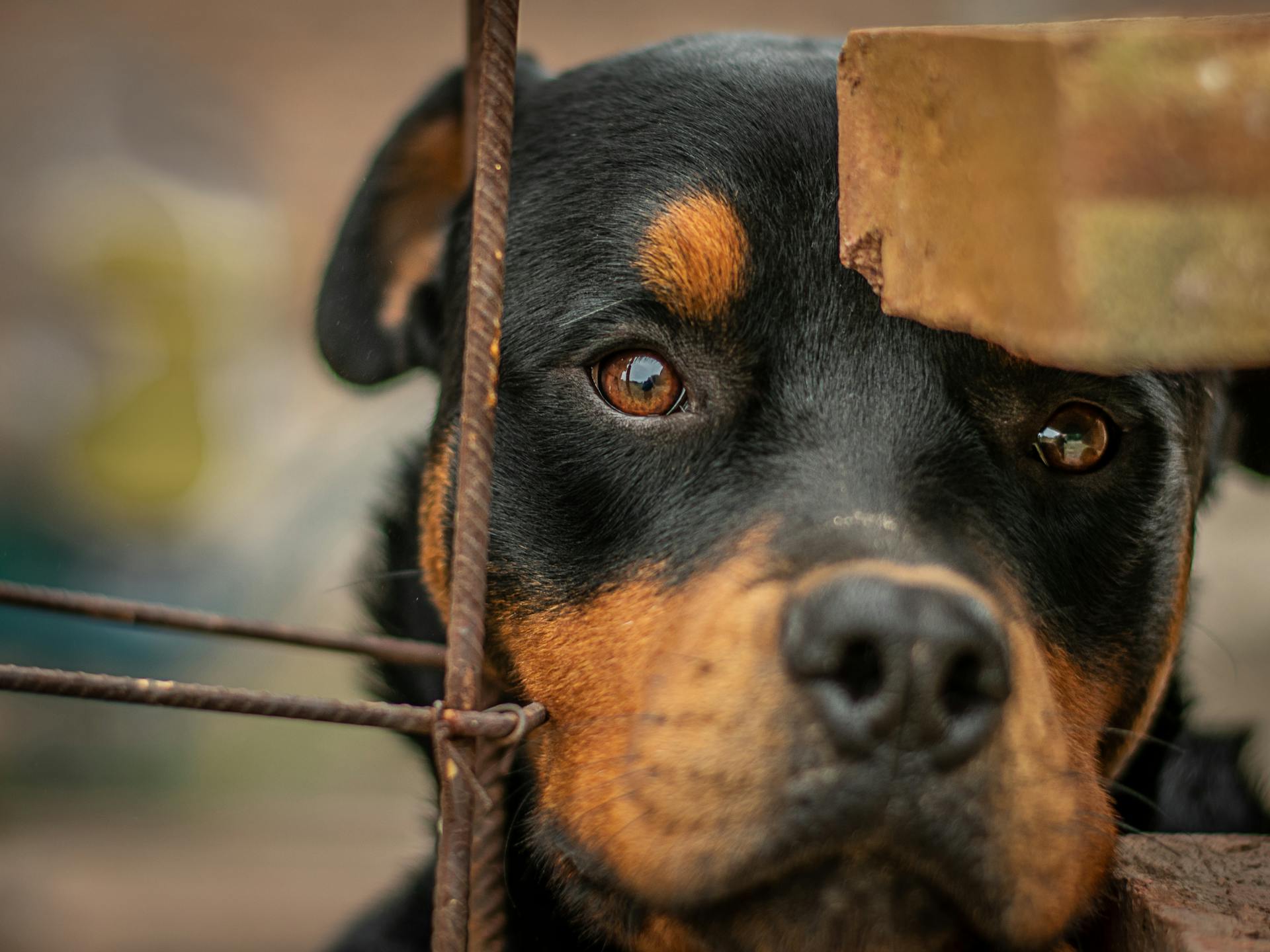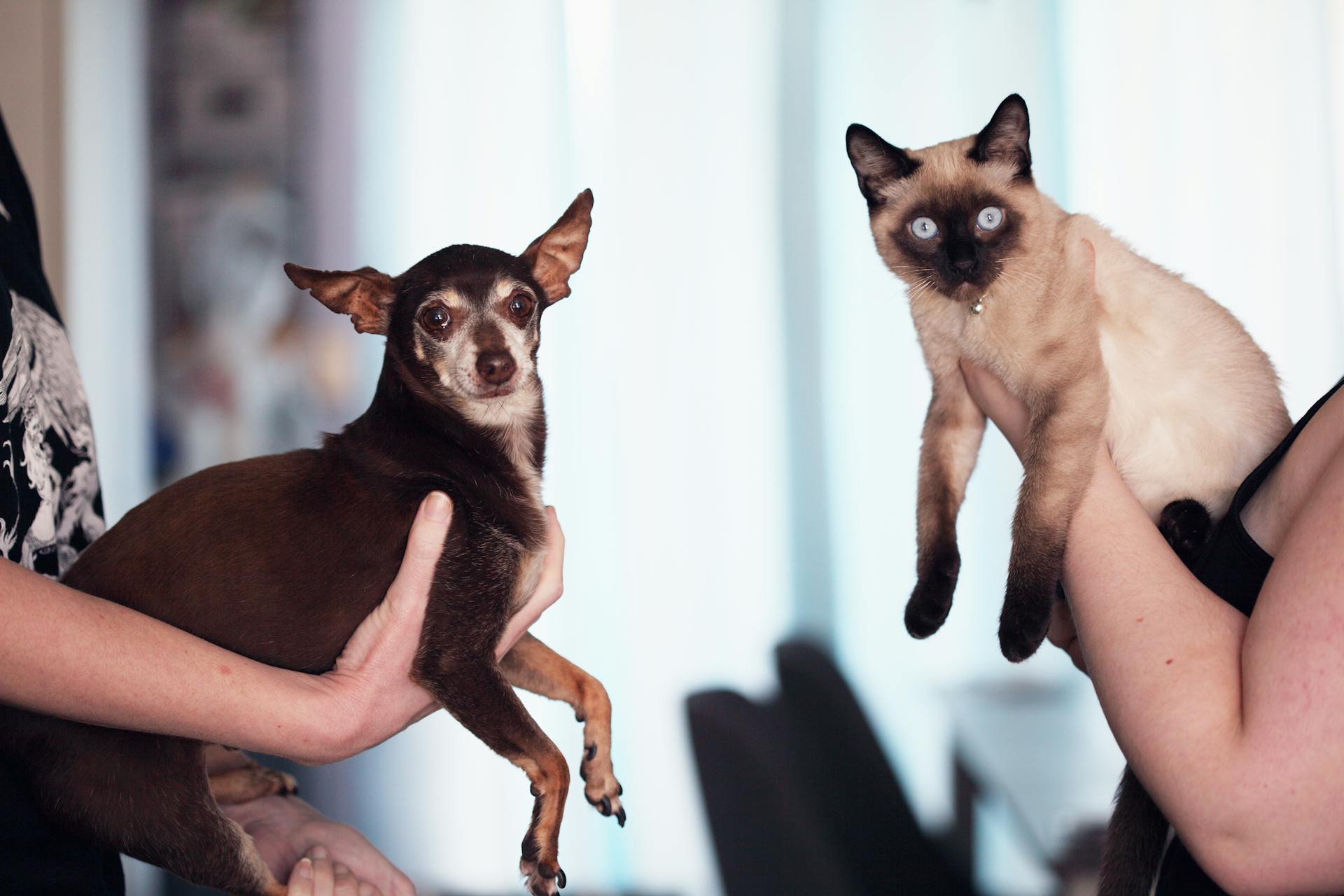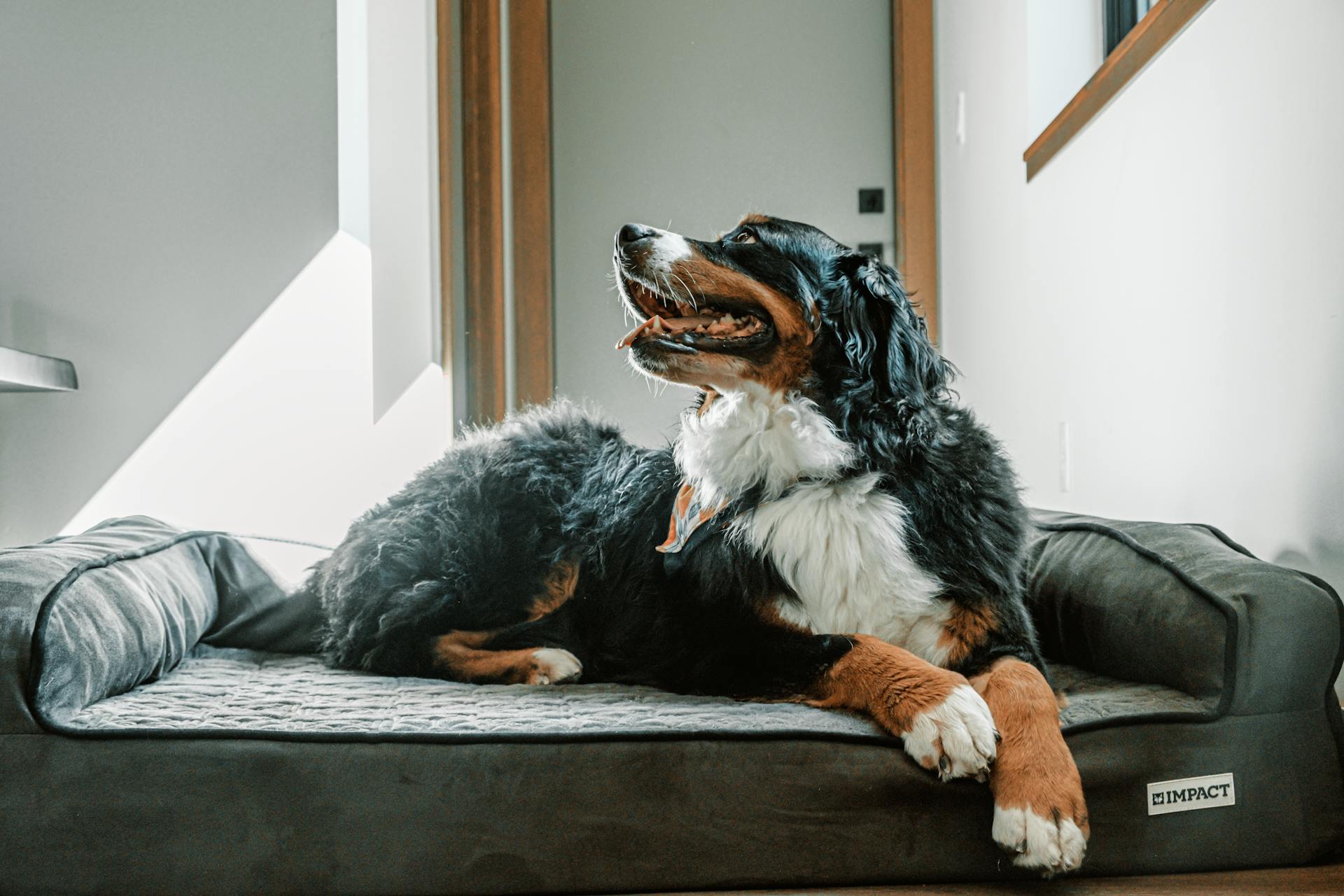
Dachshunds are generally known for their bold and confident personalities, which can sometimes make them wary of other dogs. This is due to their strong prey drive and hunting instinct.
In fact, Dachshunds were originally bred to hunt badgers and other burrowing animals, which means they have a natural tendency to chase and pursue small creatures. This can sometimes lead to conflicts with other dogs.
However, with proper socialization and training, many Dachshunds can learn to get along with other dogs. In fact, some Dachshunds are even known to be great playmates and friends with other dogs.
But, as we'll explore further, it's essential to consider the individual temperament and energy level of your Dachshund when introducing them to other dogs.
Compatibility and Pairings
Dachshunds generally prefer living with smaller dogs or other dachshunds, rather than bigger dogs.
They've been known to do well with breeds like boxers, Dobermans, and various types of terrier. Finding a good match for your dachshund's temperament is key.
Most dachshunds have strong personalities, and they get on best with other dogs that share their temperament. If your dog is playful and bossy, pair him up with a dog that's full of beans.
If your dachshund is more reserved, try and make sure his new companion is too. It's not really fair to introduce a bouncy puppy into a home with an aging dachshund, the dachshund would probably tell the pup to scram!
Dachshunds are ideally paired with companions that have a similar character and temperament. They will enjoy intelligent, playful, and social breeds since these are ingredients for fun in a Dachshund's world.
Other small breeds of a similar size, such as Pugs, make good companions for Dachshunds. Every dog is an individual, so it's essential to consider each dog's character before deciding to put two or more dogs together.
It doesn't really matter how old your dachshund is, it's more about how long they've been the only dog in the house, what their temperament is like, and whether the new dog is compatible in terms of personality.
Dachshunds were bred as hunting dogs and kept in kennels with other dogs. Because of this, like many other hunting dogs, Dachshunds are social and love the companionship of other dogs.
So, when you're not home, having a dog friend to play with will keep them entertained.
Explore further: Personality Traits of Dachshunds
Temperament and Behavior
Dachshunds can be quite possessive of their owners and may not take kindly to another dog encroaching on their territory.
Dachshunds are headstrong and playful, even mischievous at times, and their barks can sometimes annoy other dogs (and humans!). They can occasionally exhibit aggression toward other dogs, especially if they feel threatened.
Each Dachshund is unique, and some may be naturally more sociable and enjoy the company of other dogs, while others may be more independent or even territorial.
Size Differences
Dachshunds are small dogs, and if they're paired with much larger dogs, there's a risk of accidental injury during play.
Supervise playtime and intervene if the play gets too rough.
Dachshunds need to be taught how to play safely with larger dogs, so make sure you properly teach the larger dog how to play with your Dach.
Even if their game seems harmless, one wrong move can lead to injuries.
Temperament
Dachshunds are generally friendly dogs, but they can occasionally exhibit aggression toward other dogs if they feel threatened. They were originally bred in Germany to hunt badgers and still retain their tenacity and determination today.

Their small size and energetic nature can sometimes lead to possessiveness, especially when it comes to their owners. They may not take kindly to another dog encroaching on their territory.
Dachshunds can be quite vocal, and their barks can sometimes annoy other dogs and humans. They're known to be headstrong and playful, even mischievous at times.
Each Dachshund is unique, with some being naturally more sociable and enjoying the company of other dogs.
Jealousy in
Jealousy in Dachshunds can be a real issue if they feel another dog is getting more attention. Dachshunds can be jealous if they feel another dog is getting more attention.
It's essential to ensure you spend quality time with each dog and give them equal amounts of love and attention. This will help prevent jealousy from developing.
Each Dachshund is unique, and some may be naturally more sociable and enjoy the company of other dogs. Others may be more independent or even territorial.

To avoid jealousy, teach your Dachshund to respect the boundaries of other dogs. This means not allowing them to pester the other dog and providing the other dog with a safe space to retreat.
Consistent training and clearly defined boundaries are also essential in preventing jealousy. Teach all dogs basic commands and reinforce good behavior to establish a hierarchy and prevent dominance issues.
Rewarding positive interactions between dogs can also help build a positive association and encourage good behavior. This is especially important when introducing a new dog to a household with an existing Dachshund.
Training and Management
Consistent training is essential for any dog, and it's especially crucial when introducing a new dog to a household with an existing Dachshund.
Teach all dogs basic commands and reinforce good behavior to establish a hierarchy and prevent dominance issues.
Introduce both dogs while on leashes and let them engage each other when ready, watching for happy body language like wagging tails and low postures.
Explore further: Why Does My Dog Get Mad When I Sniff Him?
If either dog shows aggression or fear, separate them and try again later, as this will help prevent any negative associations.
Respect the boundaries of both dogs, especially when it comes to the older Dachshund, and provide a safe space for them to retreat to if needed.
Reward both dogs for positive interactions to build a positive association between them and encourage good behavior.
Monitor the dogs' interactions even after the initial introductions, as it's essential to be patient and give them time to set their status quo in their relationship.
You should never leave your Dachshund alone with another dog for at least six months from the moment you bring the second dog into the family.
Age and Timing
Age can be a factor when introducing a new dog to your Dachshund, especially if your Dachshund is old. They might not appreciate the disruption to their routine and peace.
Older dogs tend to mellow and slow down with age, which can lead to frustration when a young, energetic puppy is introduced. In many cases, it's not fair to either dog to add a new puppy to the household.
Giving your Dachshund at least a year to settle in before adding another dog is a good rule of thumb. This allows them to establish a routine and helps prevent the introduction of bad habits from an untrained new dog.
Discover more: When Do Dachshunds Calm down
Is My Dog Too Old for Another Dog?
Your dog's age isn't the main factor in determining if they're too old for another dog. In fact, age is not a major factor in Dachshund aggression.
However, older dogs might not appreciate the energy of a new puppy, even if it's another Dachshund. This is because older dogs tend to mellow and slow down as they age.
It's not about how old your dog is, but rather how long they've been the only dog in the house. Their temperament and personality play a big role in how well they'll get along with a new dog.
Introducing the dogs slowly and properly is key to a smooth transition. Make sure your first dog still gets plenty of attention from you, and don't rush the process.
When to Add Another Dog?
Adding another dog to your household can be a big decision, and it's essential to consider the timing. Dachshunds generally don't appreciate having a puppy around, especially if they're old.
Older Dachshunds can become grumpy and snap at younger dogs due to disrupted routines and lack of energetic companions. This is not unique to Dachshunds, but a common issue with every breed.
Before introducing a new dog to your home, think about your current dog's age and temperament. If your Dachshund is old, it's not fair to introduce a bouncy puppy, and vice versa.
It's best to give your Dachshund at least a year to settle in before adding another dog. This allows them to establish a routine and helps prevent bad habits from forming.
When introducing a new untrained dog to your trained Dachshund, be prepared to spend time training both dogs. This will save you from wasted effort and ensure a harmonious household.
Frequently Asked Questions
How to introduce Dachshunds to other dogs?
Introduce Dachshunds to other dogs in a controlled environment, starting with scent introductions in secure cages or enclosures
Sources
- https://witzig.com/blogs/community/how-to-socialize-your-dachshund-puppy
- https://www.ilovedachshunds.com/can-dachshunds-live-with-other-dogs/
- https://www.hepper.com/are-dachshunds-good-with-other-dogs/
- https://www.dogster.com/dog-breeds/will-a-dachshund-be-good-with-other-dogs-in-my-home
- https://dachshundspace.com/are-dachshunds-good-with-other-dogs
Featured Images: pexels.com


